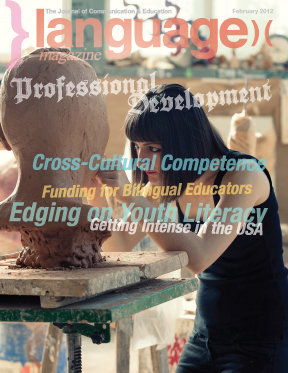Teachers Matter
Somewhat surprisingly for an Administration that has made little headway in terms of education policy, the President’s State of the Union Address (see news, page 9) made education one of its key themes. The importance of teachers and their training was also mentioned: “Teachers matter. So instead of bashing them, or defending the status quo, let’s offer schools a deal. Give them the resources to keep good teachers on the job, and reward the best ones.”
However, the President also recognized the reality: “At a time when other countries are doubling down on education, tight budgets have forced States to lay off thousands of teachers. We know a good teacher can increase the lifetime income of a classroom by over $250,000.”
Apart from some respite on student loan interest rates, there was no indication as to how teacher training and retention might be funded. We need incentives to encourage the most gifted applicants into teaching. Sure, the recession has made the profession more attractive thanks to its relative security but nearly a third of the nation’s 3.2 million teachers are approaching retirement age.
Faced with the mass media’s constant barrage against teachers, it’s not surprising that it’s difficult to persuade even moderate legislators that teachers deserve a better deal. At least teachers themselves are taking action — the National Education Association (NEA) has created a commission to “craft a new vision of a teaching profession that is led by teachers and ensures teacher and teaching effectiveness,” and “develop a comprehensive set of recommendations for education leaders and policymakers about the future of the teaching profession and the role of teachers in governing it” (see page 20).
The Commission recommends that every teacher be trained to teach English Language Learners, and, at the same time, the Modern Language Association (MLA) is promoting quality literacy and language training at the university level where K-12 teachers are educated. Central to all proposals is the importance of language and literacy in the education of our children.
Now, not for a moment should we expect teachers to be allowed to decide how their profession might develop. But, it is about time that we all stood up against teacher bashing and insisted that our media affords them the respect that they deserve. Doctors, lawyers, even soldiers are instrumental in the development of training guidelines for their peers. Surely experienced teachers are in the best position to determine how new teachers should be trained?
As Obama said in his Address: “If you want to make a difference in the life of our nation; if you want to make a difference in the life of a child — become a teacher. Your country needs you.”
In return, teachers deserve the right of self-determination.
IN THIS ISSUE:
nechE s’@chE wAsOwû — This Land Gives to You
J’Nisha Towne documents the heroic effort to preserve the Euchee language
Institutional Choices
Language Magazine asks leading educators to weigh in on the pros and cons of university-affiliated institutes and private language schools
Teachers Doin’ It for Themselves
Kristal Bivona analyzes plans to put language and technology at the forefront of teacher education
Reading, Writing, and Giving Back
Kristal Bivona gets inspired by voluntary literacy projects
Crossing the Cultural Divide
Abdelilah Salim Sehlaoui argues that language educators must develop cross-cultural communicative competence
Increasing American Exports to China
Connie K. Ho explains how the government-backed 100,000 Strong Initiative is promoting study in China
Small Town, Big City
Lizzie Olster moons over Boston as a study abroad locale
Bilingual Boom
Funding resources to meet the growing demand for dual-language educators
Spotlight on Service-Learning
Connie K. Ho introduces StudyShare.org, the new hub for service learning
Last Writes
Richard Lederer on mighty Charles Dickens



